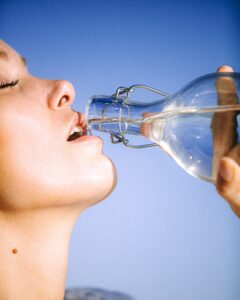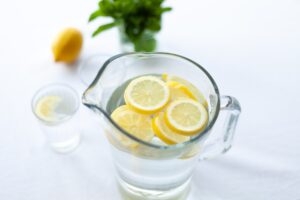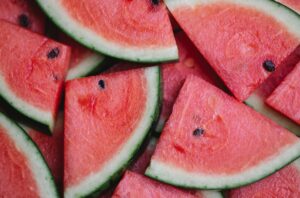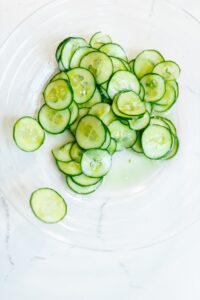ELECTROLYTES: Do You Need Them?
Tips for Staying Hydrated!

Electrolyte drinks are popping up everywhere and in so many forms… liquid, powder, and dissolvable tablets. And SO many brands! The choices are overwhelming and confusing.
First, what are electrolytes? Electrolytes are essentially charged metallic ions that, with the perfect ratio of salts and minerals, keep our heart, nerves, and muscles functioning optimally. They also help with the pH balance of our blood.
Electrolytes in the body may become too low or too high based on the amount of water in your body. Imbalance can be caused by sweating during exercise, illness causing vomiting and diarrhea, dehydration, and even drinking too much water as it dilutes electrolytes. If you’re on a low-carb diet or if you routinely drink caffeinated beverages, these can all escalate the amounts of electrolytes depleted from the body as well.
Other things that may cause electrolyte imbalance include cancer treatment, certain drugs, and kidney disease.
Electrolytes are typically minerals, whereas minerals may or may not be electrolytes.
What are minerals? Minerals are crystals that bond with water molecules to deliver energy and information to your cells, so your cells can repair themselves.
Essential minerals are separated into two groups: major minerals and trace minerals. The term “essential” means essential for our survival and proper functioning. The minerals come from rocks, soil, and water. As plants grow, they absorb the minerals, and when animals eat plants, they absorb the minerals from the plants. We don’t manufacture minerals in our bodies, we get minerals from our food. Many minerals have been depleted from the soil, affecting our food, and with certain types of water filtration, such as reverse osmosis, these essential minerals are often removed.
The most commonly known essential minerals are calcium, magnesium, potassium, sodium, iron, chloride, and zinc. Lesser-known essential minerals are chromium, copper, iodine, manganese, molybdenum, phosphorus, selenium, sulfur, and silica.

How important are minerals? Two-time Nobel laureate, Dr. Linus Pauling said: “You could trace every disease and every ailment to a mineral deficiency.”
Without proper essential minerals, a cell can’t make energy and clear out debris and that will inevitably lead to inflammation. And chronic inflammation has been linked to heart disease, cancer, diabetes, Alzheimer’s, depression, and other serious medical problems. Also, when mineral deposits from foods and water aren’t sufficient, your body will make withdrawals from your teeth and bones. And this blew my mind:
Your body can use minerals without vitamins, but vitamins and other nutrients are useless without minerals.
Numerous studies report that most Americans are mineral deficient… particularly with magnesium. Health conditions such as diabetes, poor absorption, chronic diarrhea, and celiac disease are associated with magnesium loss. Symptoms of magnesium deficiency include:
- weakness
- fatigue
- irritability
- abnormal heart rhythm
- nausea
- diarrhea
- abnormal calcium or potassium levels.
Chronic low levels of magnesium can increase the risk of high blood pressure, Type 2 diabetes, and osteoporosis. Here are some symptoms of other mineral deficiencies: Low levels of potassium can also include delirium; low levels of calcium can include personality changes; low levels of phosphorus can include confusion and bone pain. Severe symptoms of low magnesium include V-fib, tremors, seizures. Severe symptoms of low calcium include seizures, uncontrolled muscle movement, numbness/tingling, impaired intellectual capacity.
ELECTROLYTES FOR DEHYDRATION
In addition to mineral deficiency, most Americans suffer from chronic dehydration. Did you know that we lose about 1 LITER of water each night from exhaling water vapor while we sleep? Yet, most people grab coffee to start the day, adding to their dehydration. By the time we feel thirsty, some symptoms of dehydration have already kicked in.
Other causes of dehydration—in addition to not getting enough water—could be an illness, vomiting & diarrhea, a high-intensity athletic event, a night of drinking too much alcohol, and visiting or living in a high altitude (including airplane travel).

Symptoms of dehydration include:
- Difficulty concentrating and remembering things
- Low energy/fatigue
- Hunger and cravings, especially sugar
- Appearance of tired, old-looking skin
- Dry mouth
- Joint and/or muscle stiffness, cramps
- Difficulty recovering from workouts
- Darker-colored and decreased urine
- Nausea
- Irritability
- Dizziness and/or fainting spells
- Headaches
- Constipation
Chronic dehydration has been linked to:
- Dementia
- Decreased kidney function and kidney stones
- Hypertension
- Urinary tract infections
- Intestinal failures
If I’m dehydrated, can’t I just drink more water? Why are electrolytes needed?
When your body loses water you are also losing minerals. And drinking too much water to compensate can dilute your electrolytes, especially sodium.

Replenishing electrolytes can be as easy as adding a generous pinch of Himalayan or sea salt to your water; a squeeze of lemon juice or a capful of apple cider vinegar in a glass of water; or drinking coconut water (note that coconut water is much higher in potassium than sodium). If you are beyond ‘moderately’ dehydrated, some electrolyte drinks may help. If you are on a low-sodium diet, consider mineral supplements (suggestions below).
How much water should I drink each day?
The amount of water we drink daily is not one-size-fits-all like the “eight glasses a day” we’ve been told. There are many different factors that come into play for each of us: gender, weight, physical activity, and overall health. And it’s important to focus on quality as well as quantity.
The type of water you drink matters. With water filtration systems like reverse osmosis, minerals are being stripped from the water. The same is true of purified and distilled water. These are ‘non-mineralized’ or ‘demineralized’ water. The WHO issued a report showing the potential for adverse health effects from long-term consumption of demineralized water. Water wants to bond to everything, including the minerals in our food. And since our food has become mineral deficient, drinking demineralized water can lead to an even higher risk of vitamin and mineral deficiencies. And it’s worth repeating: your body can use minerals without vitamins, but vitamins and other nutrients are useless without minerals. If we are mineral deficient, think of the vitamins and nutrients we are missing out on!
Try to avoid dehydration in the first place by pre-hydrating several hours before (and ideally during and after) strenuous exercise or drinking alcohol.
Best choices for drinking water: spring water, mineralized filtered water, or remineralized water with products listed below.

MINERALS
Trace Mineral Powder 75mg 200mg 100mg 1mg
(includes many daily vitamins including Vit C (1200mg), also ionic trace minerals, and boron.)
Boron boosts magnesium absorption and affects the way the body handles other minerals such
as calcium and phosphorus.
ConcenTrace Drops 5mg 3mg 250mg 0
(includes 650mg chloride, and boron)
Daylyte Drops 50mg 150mg 65mg 0
(includes 475mg chloride from sea minerals, zinc, calcium, L-Lysine, sulfate, boron)
Eidon Ionic Minerals Multiple—contains calcium, iron, iodide, magnesium, zinc, selenium, manganese, chromium, potassium, silica, sulfur, boron.
BEAM Minerals—Micro-BOOST™ provides a full-spectrum of micronutrients as well as full-system detoxification support for the body’s cellular system (pure fulvic/humic). Includes 70+ minerals, electrolytes, and amino acids plus some B vitamins.
Electrolyte Drink Comparison
Sodium Potassium Magnesium Sugars
LMNT 1000mg 200mg 60mg 0
Liquid IV 500mg 370mg 0.4mg 1
(includes Vitamins C, B3, B5, B6, B12)
Nuun 300mg 150mg 25mg 1g
Nectar 100mg 250mg 50mg 0
(includes 75mg calcium)
Seeking Health 140mg 510mg 150mg 2g
(includes taurine, creatine)
Cure 240mg 350mg 0 4g
EnduroPacks (pump) 100mg 125mg 50 0
(includes ionic trace minerals)
WaterBoy Weekend Recovery 1130mg 344mg 54mg 0
(includes Vit C, B12, L-Theanine, ginger)
Gatorade Zero (12oz) 160mg 50mg trace 0
Gatorlyte (20oz) 490mg 350mg 105mg 12mg
Pedialyte powder 490mg 370mg trace 12mg
Powerade* (12oz) 240mg 80mg 0 34mg
(includes Vit C, B2, B6, B12)
*Note the ingredients: WATER, HIGH FRUCTOSE CORN SYRUP, RED40 (linked to ADD & cancers)
Notes:
- Avoid electrolyte drinks with artificial flavors or colors, food additives, sucralose, citric acid (typically GMO), any coloring, and ‘natural’ flavors (companies are not required to disclose ingredients).
- Avoid sports/energy drinks with caffeine as it is a diuretic and you will lose water.
- Drinks low in sugar may not be the best supplement for athletes. Sugars can be helpful for athletes that not only need to replenish electrolytes but also benefit from carbohydrates to provide energy to maintain prolonged physical activity… just be sure the drinks are not too
Water from fresh food can be up to two-thirds more hydrating than water from a glass.

Top 10 Hydrating Fruits
- Starfruit
- Watermelon
- Strawberries
- Grapefruit
- Cantaloupe
- Pineapple
- Raspberries
- Blueberries
- Kiwi
- Apples

Top 10 Hydrating Veggies
- Cucumbers
- Romaine Lettuce
- Celery
- Radishes
- Zucchini
- Tomatoes
- Peppers
- Cauliflower
- Spinach
- Broccoli
Foods with minerals: Avocados, bananas, and spinach are fantastic sources of potassium, while nuts, beans, dark leafy greens, and whole grains are high in magnesium.
Want more nutrients in your food? Find food from regenerative farmers. 90% of animal products in grocery stores come from factory farms, which are bad for the animals, the environment, and anyone eating that meat. Regenerative farming restores nutrient density to our soil, and sequesters carbon from the atmosphere back into the ground where it belongs. Beef, chicken, and pork from regenerative farmers is more nutritious and packed with way more flavor!
Find a local regenerative farm here.
Or, my absolute favorite is from Wild Pastures (from the PaleoValley family) Click here for $20 off your first order… and share! When you refer friends, you’re helping support small-scale American farmers, regenerative agriculture, and chemical-free farming practices. Plus, give $20 and you get $20!
Want minerals in your coffee? Dave Asprey, founder of Bulletproof Coffee, now has Danger Coffee — lab-tested, mold-free, and crafted with a remineralization process that delivers detoxing trace minerals and electrolytes. www.dangercoffee.com
If you experience a more serious electrolyte imbalance, whether too low or too high, it can have potentially serious negative effects on your heartbeat, since your heart is a muscle. And don’t do what I did—I sampled many electrolytes at once (yeah, duh!) I was close to going to the ER with a racing heart/abnormal heartbeat and diarrhea. NOT pleasant. 😉
- Some minerals can interact with each other, so you should never take multiple supplements together without consulting your doctor first.
- As with any nutritional supplement, be sure to read the ingredient label carefully.
- If you need to watch your sodium intake levels, consult with your physician prior to taking electrolyte supplements.
KISS: Keep it Simple, Stupid (Story at a glance)
- Electrolytes keep our heart, nerves, and muscles functioning optimally and help with the pH balance of our blood.
- Electrolytes are typically minerals, whereas minerals may or may not be electrolytes.
- The major essential minerals are calcium, magnesium, potassium, sodium, iron, chloride, and zinc.
- Your body can use minerals without vitamins, but vitamins (and other nutrients) are useless without minerals.
- Most Americans are mineral deficient and chronically dehydrated.
- When your body loses water you are also losing minerals. And drinking too much water can dilute your electrolytes, especially sodium.
- Replenishing electrolytes can be as easy as drinking coconut water or adding a pinch of Himalayan or sea salt and/or a squeeze of lemon juice to your water.
- Water quality is as important as quantity.
- Best choices for drinking water include mineral or spring water or remineralized water.
*This is not medical advice. It is intended for educational purposes only.
Photos provided by pexels.com
Resources:
https://www.mamavation.com/health/best-electrolyte-replacement-drinks-coconut-water.html
https://www.mindbodygreen.com/articles/best-electrolyte-powder
https://www.tldrpharmacy.com/content/a-clinicians-guide-to-inpatient-electrolyte-replacement
https://www.gopurepod.com/a/blog/americas-chronic-dehydration-problem
https://www.ncbi.nlm.nih.gov/books/NBK555956/
https://www.livestrong.com/article/507396-negative-effects-of-drinking-too-many-electrolytes/
https://hydrationfoundation.org/
